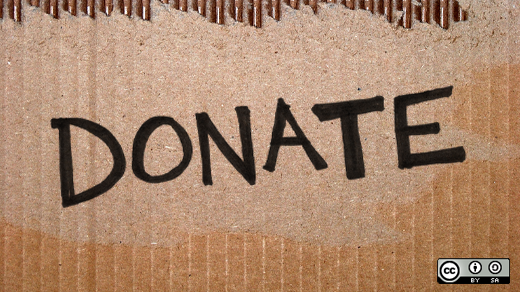A project in which I'm involved, in the middle of a time of change, recently received an enquiry from a member of its user community. The enquirer was pleased with the software, concerned about the changes and wanted to provide support to the project to ensure it continued and as an expression of gratitude. "Where should I make a donation to support the software?"
It sounds like an easy question, but the issue is more complex than you might think. While open source projects are created by members of their co-developer community, that does not mean the development is funded through that community. Open source projects are collaborations between motivated individuals. I can think of very few projects where the community entity funds development - a tiny percentage of projects. When a charity or trade association supports a community, it typically does so by employing administrative, legal and financial staff, with a view to supporting the technical, community and market operations of the community and freeing community members to focus on the project itself.
In fact, most communities I know strongly oppose the idea of the community entity engaging in development. There have been heated disputes caused in some communities by even a perception that development would be centrally funded. That's because it's a proven disincentive to community vitality. This is not to say that work done by open source community members is unpaid. Research shows that many projects are deeply dependent on community members who are paid to work on the code. But they aren't paid by the community; they are paid by activities that benefit from the code. Open source is not a charity even if it's administered by one, and it doesn't need "monetising".
An open source community involves many parties coming together around a source code commons and synchronising the overlapping parts of their interests. As they do so, they each pay their own way from their own resources. For anyone to be centrally funded would upset the balance, disrupt the community and probably offend and alienate the participants who aren't being centrally funded.
Since you can't promise to fund all participants in an open source community, it's better to fund no participants so that everyone is equal within the boundaries of the community. If you're grateful an open source project exists and you want to support it financially, the very best thing you can do is buy things from members of the community (or support their charitable work if they are a non-profit).
Buy a subscription. Buy training. Buy anything the project's co-developers make out their work in the project (well, as long as it respects your freedoms!). In general, the people paying for the administration of the community entity will be the people supplying those things (do check!). While it's OK to also contribute to the central entity so they can pay their staff, it's best to do that after you've started buying from or donating to the community members as they conduct the external interest that motivates them to work in the community.
And of course, join in with the community yourself too and then donate to its upkeep!




Comments are closed.